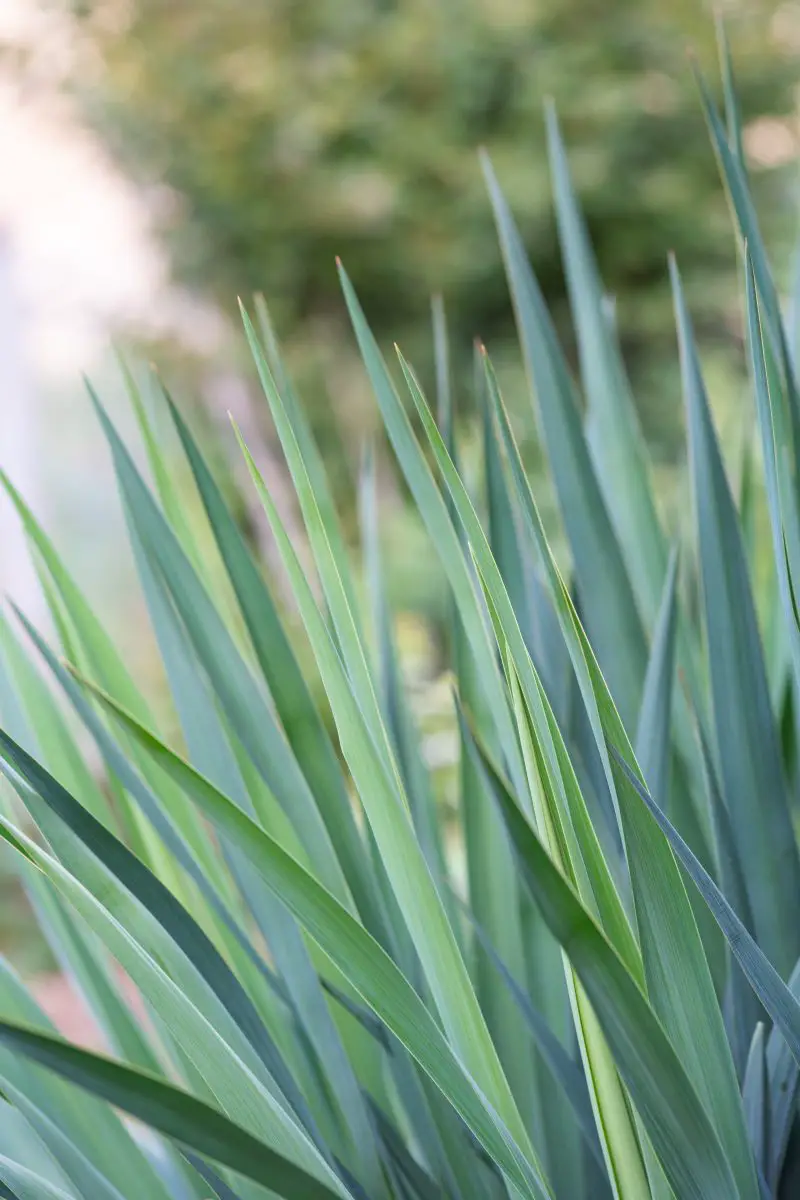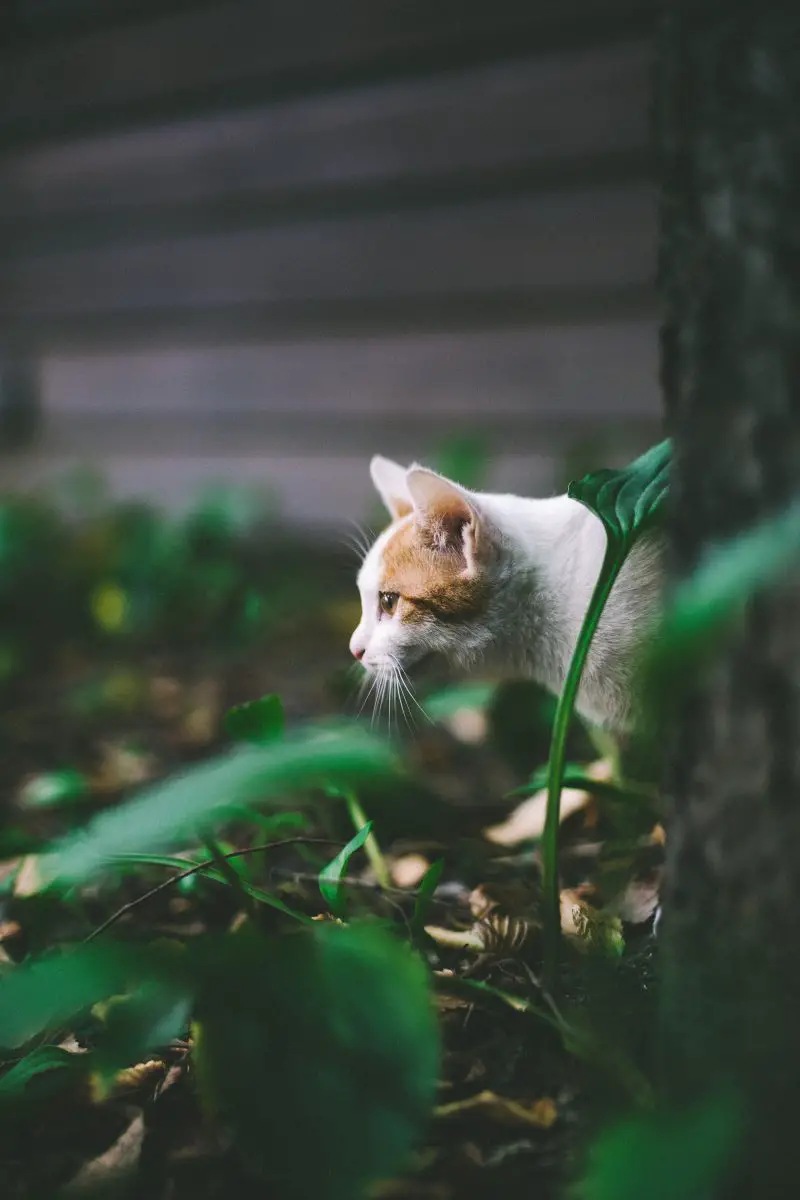Many cat owners also love decorating the interior and exterior of their home with plants. After all, you have a tiny predator in your home. Why not give them places to hide? Unfortunately, many plants that people put in their homes are not safe for their feline companions. Take, for instance, the gorgeous yucca plant, with its beautiful white flowers and towering leaves. Are yucca plants poisonous to cats?
Knowing which plants are safe for cats and which aren’t could be lifesaving. So let’s find out if yucca is poisonous to cats.

Table of Contents
- What is Yucca?
- Are Yucca Plants Poisonous to Cats?
- Symptoms of Yucca Toxicity in Cats
- What Should I Do If My Cat Ate Yucca Plant?
- How Do I Prevent Yucca Poisoning?
- What About Those Yucca Pet Supplements?
- The Verdict on Yucca
- FAQs
What is Yucca?
There are over 40 species of plants within the Yucca genus. The plant is native to both the Americans and Caribbean islands. Some species have broad, sword-shaped leaves and clusters of white blossoms. In gardens, yucca is purely ornamental and is reminiscent of gigantic lilies-of-the-valley. But you can also grow yucca indoors.
Yucca is a plant with a medicinal root that humans often use for migraines, inflammation, osteoarthritis, and diabetes. Other parts are edible, including the stems, yucca fruit, roots, seeds, and blossoms. In Native American cultures, yucca root from Yucca schidigera, or Spanish dagger or Mojave yucca, was commonly used.
Do not confuse yucca with another plant called yuca, which is also known as manioc or cassava. These are two differently, entirely unrelated plants.
Are Yucca Plants Poisonous to Cats?
The ASPCA has stated that, yes, yucca is very toxic to cats, dogs, and also horses (when ingested at high amounts). Fortunately, the plant isn’t toxic to human beings. But what makes yucca plants poisonous to cats and other animals?
That would be the steroidal saponins, a compound that protects the plant from insects and fungal growth. Saponins cause gastrointestinal upset when ingested, which is why it has been listed as toxic to animals. For cats, reactions go beyond digestive struggles and discomfort. They tend to have severe reactions.
There are other come household plants that contain steroidal saponins and are, therefore, unsafe for felines to be around. This includes:
- Tulip bulbs
- Ale
- Azalea
- Corn plants
- Dragon tree
- Larkspur
- Money tree
- Daffodils
- Lucky bamboo
- Bird of paradise
- Chrysanthemums
- Begonias
- Baby’s breath
- Snake plants
- Lavender
Is Yucca Cane Poisonous to Cats?
You might here yucca referred to as yucca cane. This is generally describing the edible part of the stem. While humans can use yucca stem in cooking and medicines, cats shouldn’t go near yucca plants or yucca cane. Even a slight scratch that draws blood could cause a reaction.
Yucca cane, as well as the flowers, seeds, and roots, are dangerous for cats and kittens.

Symptoms of Yucca Toxicity in Cats
You now know that yucca is poisonous to cats because of steroidal saponins. All parts of the plant, even those that humans can eat without any issue, have some level of toxicity for dogs, cats, and grazing animals.
When your cat ingests a part of the yucca, they will have a reaction. Symptoms of yucca poisoning in cats include:
- Shortness of breath and panting
- Drooling
- Dilated pupils
- Elevated heart rate
- Upset stomach and abdominal pain
- Diarrhea and gas
- Vomiting
- Muscle weakness
- Uncoordinated movement
- Seizures
- Body tremors
Seizures are rare, but they are life threatening. If your cat is displaying these symptoms, consider this an emergency and find a veterinarian immediately. There is no time to waste.
What Should I Do If My Cat Ate Yucca Plant?
Yucca, like pothos, isn’t always a death sentence when your cat takes a nibble. As long as you take action immediately, you can save your friend’s life.
Any of the symptoms listed above—like vomiting, diarrhea, tremors, and weakness—typically mean your cat has eaten something toxic. Even if you didn’t see them eat the yucca, assume that they are going to need medical attention.
Call your veterinarian and see if you can be seen as soon as possible. Another option is to call the pet poison control hotline for assistance.
Never try to induce vomiting in your cat alone, as this could panic your friend and increase their distress. The best thing to do is provide water, so they don’t get hydrated, and wet food or broth. The faster you react to the poisoning, the greater the chance of your cat’s survival without any long term damage.
How Do I Prevent Yucca Poisoning?
If you have beautiful yucca plants growing outside where your cat likes to play, you might be loath to remove them. If those plants have been there this whole time and show no signs of getting disturbed by your cats, there’s a great chance your furry companion will leave the yucca alone. So you don’t have to get rid of them. Planning on bringing home a new cat and have potted yucca in the house? That’s when you don’t take the chance.
Keep all yucca out of reach or somewhere your cat won’t be tempted to disturb the plants. Of course, the best way to keep your cats from getting poisoned is to keep all poisonous plants out of your home. While this does limit the number of houseplants you can have, there are options.
Cat-safe plants that can replace your yucca include:
- Boston fern
- Baby rubber plant
- Cat grass
- Sage
- Velvet plant
- Catnip
- Spider plants
- Prayer plants
- Christmas cactus
- Lady palm
- Marigolds
All of these plants can be grown indoors easily. Some even clean the air! Plus, your cat will be safe to give them a curious bite once in a while. But have in mind that chemicals for plants can be toxic too so be conscious when using any.

What About Those Yucca Pet Supplements?
Interestingly, there are yucca pet supplements out there marketed as 100% safe for your cats and dogs to use. The steroidal saponins that make yucca dangerous can also be beneficial when taken in small doses. Obviously, as a pet owner, seeing yucca in your pet’s food or health supplements can be confusing and off-putting, particularly after learning how harmful it can be.
That’s why it’s worthy of discussion!
First off, why is Yucca schidigera added to pet food? One of the reasons people give their pets a tiny drop of yucca is for the plant’s amazing ability to diminish the smell of poop. Saponins act as a detergent in the large intestine, reducing the amount of ammonia. For similar reasons, yucca has been added to poultry and livestock diets for many years.
But What Makes Yucca Supplements Safe to Eat?
Yucca plants, meaning yucca in its rawest, most purest form, are incredibly toxic to cats. Whether your four-legged companion nibbles on a few leaves or accidentally gets scratched while rubbing up against the plant, they could have an alarming reaction to the saponins. However, when that same plant is processed and diluted, it’s safe.
Offered in moderation, yucca supplements have nutritional benefits. Yucca is high in B vitamins, Vitamin C, fiber, beta-carotene, and a bunch of other minerals. The fiber in yucca aids in digestion and promotes a healthy gut. The antioxidants also protect your cat from diseases.
Yucca can also assist with inflammation and allergic reactions.
If you’re interested in supplementing with yucca, make sure you only use the vet-recommended products available. That supplementation should never exceed 50mg a day. Larger quantities of even diluted yucca can bring out those toxic effects mentioned earlier. Lastly, never give your cat raw yucca, as that is highly toxic and will have the opposite effect on your pet.
The Verdict on Yucca
So are yucca plants poisonous to cats? Yes, raw yucca is dangerous. The compounds in the plant can cause gastrointestinal and nervous system distress. Sometimes, cats may even die. Therefore, if you suspect your cat is suffering from yucca poisoning, you need to see a veterinarian ASAP.
That said, small doses of diluted yucca may be beneficial for some cats and given as a supplement. However, you should only consider this after speaking with a trusted vet!
FAQs
Yes, some species of yucca plants can be toxic to cats. Yucca plants contain compounds called saponins, which can be harmful if ingested by cats. The severity of the toxicity can vary depending on the species of yucca and the amount ingested. Ingesting yucca plants can lead to symptoms such as vomiting, diarrhea, drooling, abdominal pain, and in severe cases, even more serious health issues.





